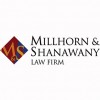
Probate is a court-supervised process for identifying and gathering the assets of a deceased person (decedent), paying the decedent's debts, and distributing the decedent's assets to his or her beneficiaries. A Trust is a creature of the law in which one party the Trustee has legal ownership of any form of property that has been transferred to him/her or "it" (e.g., a bank) by the person establishing the Trust.
For the past 25 years, Attorney Michael D. Millhorn has focused his practice on estate planning, advising his clients on wills, trusts, estate planning, estate and trust administration and probate administration.
For the past 25 years, Attorney Michael D. Millhorn has focused his practice on estate planning, advising his clients on wills, trusts, estate planning, estate and trust administration and probate administration.
Services
When a person dies, certain matters have to be taken care of by somebody lawyer or not whether there's a Will, Trust or neither one.
First, there is the funeral.
Then, bills have to be paid; personal business and insurance matters must be concluded.
Final personal income tax and inheritance tax returns must be filed, as well as a federal estate tax return, if necessary.
The dwelling might have to be vacated.
All sorts of property must be accounted for, secured, divided appropriately and formally transferred as required.
First, there is the funeral.
Then, bills have to be paid; personal business and insurance matters must be concluded.
Final personal income tax and inheritance tax returns must be filed, as well as a federal estate tax return, if necessary.
The dwelling might have to be vacated.
All sorts of property must be accounted for, secured, divided appropriately and formally transferred as required.
An exclusion from gift taxes for gifts by a donor to a donee which is available on an annual basis.
The annual exclusion is currently $15,000.00 per donor, per donee, per calendar year (indexed for inflation after 1998).
The gift must be a "present interest" i.e., a gift available immediately to the donee, as opposed to a gift not available until the future or a gift requiring action to qualify.
A person who is, or will be, a recipient of benefits from a Person, Will, Trust or Estate.
A Trust which contains property on which Federal Estate Taxes are paid at the death of the first spouse to die and which typically is not taxed at the death of the second spouse.
The annual exclusion is currently $15,000.00 per donor, per donee, per calendar year (indexed for inflation after 1998).
The gift must be a "present interest" i.e., a gift available immediately to the donee, as opposed to a gift not available until the future or a gift requiring action to qualify.
A person who is, or will be, a recipient of benefits from a Person, Will, Trust or Estate.
A Trust which contains property on which Federal Estate Taxes are paid at the death of the first spouse to die and which typically is not taxed at the death of the second spouse.
Florida Courts Help seeks to help Floridians who represent themselves in family law cases.
The Florida Courts Help app works on Apple and Android phones and tablets.
The app offers in one place information for people seeking a divorce, adoption, orders of protection, name change, and other family law issues.
Also available are Landlord/Tenant forms and a guided do-it-yourself procedure for completing and filing these forms with the Court.
Pointers and contact for a full range of legal help from multiple online resources, free and low-cost legal services, lawyer referrals and other information, including eligibility criteria.
The Florida Courts Help app works on Apple and Android phones and tablets.
The app offers in one place information for people seeking a divorce, adoption, orders of protection, name change, and other family law issues.
Also available are Landlord/Tenant forms and a guided do-it-yourself procedure for completing and filing these forms with the Court.
Pointers and contact for a full range of legal help from multiple online resources, free and low-cost legal services, lawyer referrals and other information, including eligibility criteria.
No. Joint tenancy does not avoid probate upon the death of the last owner.
For instance, if you and your spouse own your house as joint tenants and you die the house passes to your spouse free of probate.
However, when your spouse dies, or if you and your spouse die simultaneously, the property will be subject to probate because there is no surviving joint tenant.
Had the house been placed in a Living Trust, there would be no probate at either death.
That is the one question only you can answer.
For instance, if you and your spouse own your house as joint tenants and you die the house passes to your spouse free of probate.
However, when your spouse dies, or if you and your spouse die simultaneously, the property will be subject to probate because there is no surviving joint tenant.
Had the house been placed in a Living Trust, there would be no probate at either death.
That is the one question only you can answer.
A WILL also contains the name of the person chosen to administer your estate, and perhaps an alternate or co-administrator.
A WILL, if you have minor children, may contain the name of your choice for guardian of you minor children in the event of your unexpected death.
A LIVING TRUST is a legal document that resembles a WILL.
In contains instructions for the management of assets should you become disabled and directions for the distribution of assets upon death.
A LIVING TRUST Can avoid guardianship by providing for the management of assets should you become incapacitated or incompetent.
A WILL, if you have minor children, may contain the name of your choice for guardian of you minor children in the event of your unexpected death.
A LIVING TRUST is a legal document that resembles a WILL.
In contains instructions for the management of assets should you become disabled and directions for the distribution of assets upon death.
A LIVING TRUST Can avoid guardianship by providing for the management of assets should you become incapacitated or incompetent.
Reviews

Be the first to review Millhorn & Shanawany Law Firm.
Write a Review


